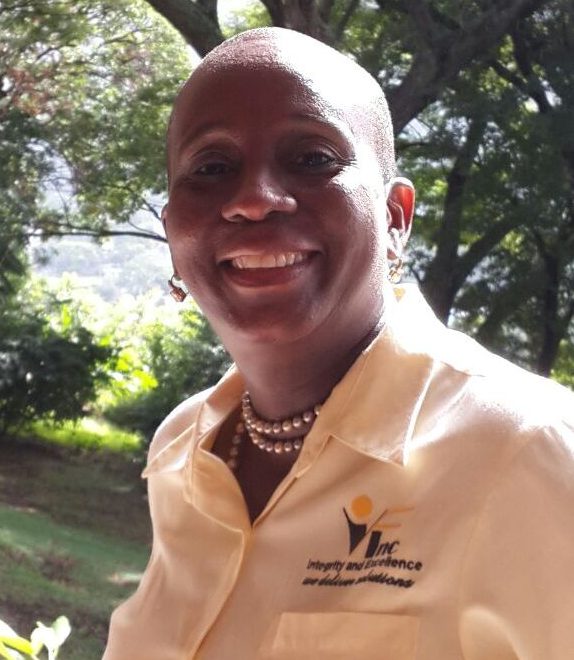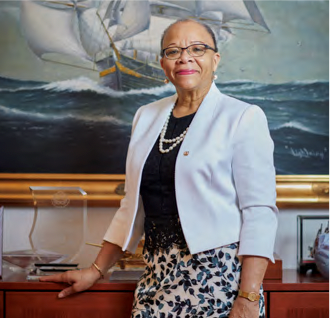
We are back! It has been about two months since our last issue. In that intervening period, we introduced Daily Reflections from our CEO, Dr. Valda Henry. The plan was to discontinue the Reflections once the Voice got back on stream, however, due to the positive reviews, the Daily Reflections will continue.
We are pleased to mark our return with this article by Dr. Cleopatra Doumbia-Henry, President of the World Maritime University.

There are two sectors of economic activity which today continues to be male dominated. They are mining and maritime – the two “M” sectors. Although the number of women in the maritime profession is increasing (particularly with respect to shore-based jobs), it remains very much a male-dominated industry today. Overall, women represent only two per cent of the world’s 1.25 million seafarers. Ninety-four per cent of the two per cent women seafarers are employed in the cruise industry, particularly in catering and as cleaners on passenger ships, while just six per cent of the 2% are employed on cargo vessels (e.g., container ships, oil tankers). Perhaps more than any other profession, access to the seafaring profession still poses today one of the greatest challenges for women.
The reasons for women’s limited access to the profession mirror many of the reasons women are excluded from other technical professions. In the case of shipping there are still unfounded beliefs that women are incapable or unsuited to seafaring due to the physical demands of the work; ideas that women are uniquely responsible for family and household responsibilities, which make long periods away from home problematic; and concerns regarding women’s occupational safety and health.
There is a great need to sensitize and create greater awareness of all relevant stakeholders of the contribution women can make to the industry. The Maritime Labour Convention, 2006 (MLC, 2006), for which I was responsible when I worked at the International Labour Organization (ILO), is the most gender sensitive of international legal instruments, outside of the gender instruments adopted by the United Nations to date. It is now important to exploit the opportunity that the MLC, 2006 presents to design and put in place strategies for greater sensitization of women, thereby attracting and retaining women seafarers in the industry[1].
In this respect, the MLC, 2006 provides that all member States shall ensure that laws and regulations respect ILO fundamental rights at work. Article III of the Convention specifically provides for the fundamental right to “the elimination of discrimination in respect of employment and occupation”.
The MLC, 2006 does not use the term “seaman” or “seamen”. Throughout the entire 100-page Convention, the terminology consistently used is that of “seafarer” or “seafarers” in all language versions. The term “seafarer” is defined in Article II, paragraph 1 (f) as “any person who is employed or engaged or works in any capacity on board a ship to which the Convention applies”. It is totally gender neutral. This is a sea change that is hoped will influence future international maritime instruments developed by the IMO.
During the development of the MLC, 2006 an interesting debate took place in connection with paragraph 9 (b) of Standard A3.1, which requires separate sleeping rooms for men and for women. The provision reflected the need to modernize requirements and to encourage more women to become seafarers. The final text in the MLC, 2006 provides that “separate sleeping rooms should be provided for men and women”. Concerning “sanitary facilities”, Standard 3.1, paragraph 11 of the MLC, 2006 also provides that “separate sanitary facilities” shall be “provided for men and women”. Very strong views were expressed during the negotiations that led to the adoption of this provision to the effect that if this were not done, it would discourage employers from recruiting women and would therefore further prejudice the employment of women seafarers.
At its the Second Meeting of the Special Tripartite Committee of the MLC, 2006, held in February 2016, new amendments to the Convention were adopted which were adopted by the ILO Conference in June 2016. The amendments made to Title 4 of the MLC, 2006 concerned the health and safety protection and accident prevention provisions of the Convention and specifically concerned shipboard harassment and bullying. Text was added to Guideline B4.3.1 requiring that account should also be taken of the latest version of the Guidance on eliminating shipboard harassment and bullying jointly published by the International Chamber of Shipping and the International Transport Workers’ Federation. Two new provisions were introduced. A new clause was included in Guideline B4.3.1 concerning occupational accidents, injuries and diseases. It specifies that the implications for health and safety should also take into account “harassment and bullying”. A new clause relating to “problems arising from harassment and bullying” was added in Guideline B4.3.6 concerning subjects of “investigation” to which shipowners should give consideration.
Finally, mention should be made of a resolution, adopted by the International Labour Conference in 2006, when it adopted the MLC, 2006, requesting the Director-General of the ILO to give due priority in the use of resources to examining measures which can further promote career opportunities and appropriate working and living conditions for women seafarers.
It is now more important than ever that action is taken to attract more women to maritime and ocean industries.
»»»»»»»»»»»»»»»»»»»»»»»»»»»»»
We have in store some inspirational interviews and we know that you will be inspired. The first interview to be presented will be an interview with Mrs. Samantha Antoine-Purcell, Founder and CEO, of St. Georges Institute, a newly opened private secondary school in Grenada.
We look forward to hearing from you with comments on this article, suggestions for topics to be covered and sharing of your HR experience. Please feel free to share.
[1] See, Report of the Director-General on developments in the maritime sector, International Labour Conference, 94th (Maritime) Session, 2006, Report II,
Book and Save those Dates:
March 8 – 9, 2021:
VF Inc Wealth Symposium
March 11 – 12, 2021:
VF Inc HR Conference

Disclaimer: The comments posted do not necessarily reflect the views of DominicaNewsOnline.com and its parent company or any individual staff member. All comments are posted subject to approval by DominicaNewsOnline.com. We never censor based on political or ideological points of view, but we do try to maintain a sensible balance between free speech and responsible moderating.
We will delete comments that:
See our full comment/user policy/agreement.